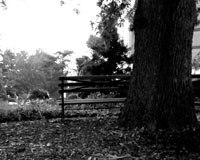
A New Walk
Hapax Legomena
"The Ephemeral Is [Not] Eternal"
Aubade at West Quoddy Light
Halfway up, beyond
the gravel road, the seafood packing plant,
the bog-and-peat low
ground, dimmed over with pine and leaning
birch, the path disappears,
The rest of the way climbs over bald stone
too exposed and wind-
scourged for all but the toughest
stunted trees, gnarled
sheep’s laurel, and mostly low-bush blueberry.
The rich cut-wood scent
of ripe berries rose up and stepping closer, I flushed
some half-dozen quail.
Their wings loud, frenzied, concussive—
too present.
Their cries and silhouettes—gaps cut from the light.
And a quiet condensed
in the afterwards, a spindle of mist, and dispersed . . .
I’d not still remember
that explosion of wings except for the inward echo
of apprehension, the shudder—
in that moment—its breaking—the presence of
I will call it silence. Silence
like seed-grit in the berry, the dust speck
at the icy core
of the core of a clattering hailstone.
Read either the rain on a jewelweed leaf
or translate a length
of salt-silvered driftwood
worm-etched wind-polished
a gribbled text of sever and surrender—
same difference. Or else
trace a gilded bit of camphor-wood halo
inscribed with one blue illegible glyph.
The nanohairs on the leaf surface catch
and almost hold three pendant drops—
Gone, gone, gone on beyond
"The Ephemeral Is [Not] Eternal"
after Wolfgang Laib’s “Where have you gone—where are you going?”
An aggregate of agate and honey,
luster and poppy,
straw shocked and doused with rain,
and a roil of malleable and marble,
meadow and flesh,
an effigy of summer’s passing,
plutonic but light,
light but dim,
sweetness held prisoner,
the cell is lit with the idea of silence.
A refuge for summer
or its tepid grave
where the solstice stands at zenith all year
persisting, with bird song,
hurry and the growing
threat subtracted,
the lost wax
for this casting, the negative space—
is not nostalgia but its inverse, grief.
Stunted and gust-bent, snuffed down,
it seems, to a last
mumble over the blackened coals,
the fire casts
a shuddered light, its pulse
gone faint.
False dawn is coming on, the stars’
salt glint
dissolves in gray, here at the raw
edge of the continent.
A spruce has snagged a rust-stained
tuft of cloud.
Afloat on a viscous mineral sea, the rock
and clear-cold Atlantic,
older than life, persist,
we try believing, almost,
beyond our human power to destroy
or preserve.
The winds drop and shift; half-revived
the flames lift
a page of ash as light as torn-loose
wasp-nest-paper.
When the moment we thought we had come for—
before we looked
down into the pools: periwinkles, red fringed algae,
dog whelks,
hermit crabs, a 4-armed star’s slow-motion
predation up
the cragged slick rockweed-pelted cliffs toward
a deep-blue mussel shoal—
arrived, we barely noticed. The single drop
of amber honey
upwelling like blood from pricked skin,
the fog-bleared sun from the sea.
Jennifer Atkinson is the author of five books of poetry. The most recent, The Thinking Eye, was published by Free Verse Editions of Parlor Press in 2016. Individual poems have appeared in journals including FIELD, Image, Witness, Poecology, Terrain.org, Missouri Review, and previously in The Cincinnati Review. She teaches in the MFA and BFA programs at George Mason University in Virginia.

